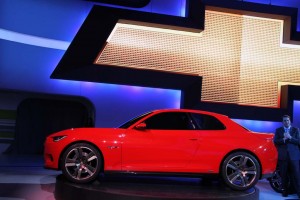
Automakers are struggling to find a way to get Millennials out of neutral with concepts like the Chevrolet Code-130R.
U.S. auto sales are expected to show modest gains for June when the numbers are tallied up, but while the industry may be one of the few bright spots in an otherwise weak recovery, car sales are still lagging almost 3 million units annually below where they were a decade ago.
And a new study suggests that we won’t be seeing those old peaks anytime soon. But don’t blame the economy, according to AlixPartners, a financial advisory firm based in Detroit. Blame the folks that the firm’s managing partner John Hoffecker calls “Gen-N.” That’s “N,” as in “Neutral about driving.”
These are “new drivers who are really not even interested in getting a license,” explained Hoffecker.
AlixPartners’ new study echoes other recent research that finds so-called Millennials are far less committed to owning a car than Gen-Xers or, especially Baby Boomers. They are, in fact, about six times less likely to get a driver’s license during their teens. And even when they do they are less likely to purchase a vehicle.
“It’s a big challenge,” said Clay Dean, head of advanced research for General Motors, during a conversation with TheDetroitBureau.com earlier this year.
Making matters worse, established buyers, like those Boomers, are driving less and hanging onto their vehicles longer. According to the new AlixPartners study there are as many as 5 million fewer motorists in the market than the growth in the U.S. population might suggest – which is one reason why car sales will settle in somewhere around 14.3 million this year, rather than reaching past levels of 16 million or more.
Meanwhile, the new study contends that the recent surge in sales of small cars and crossovers is not a passing fad simply dependent upon higher fuel prices. It is expected to continue through at least 2016. In part, that reflects the appearance of new and more attractive compact models, such as the Ford Focus and Dodge Dart, replacing the segment’s classic econoboxes.
According to Hoffecker, the auto industry is showing unusual restraint in dealing with shifting trends. In particular, it isn’t rushing to add capacity as the U.S. market slowly recovers, as it might have in the past. During the recent economic downturn a total of 18 assembly plants were closed, but makers are behaving in a “rational way,” rather than trying to capture short-term sales by taking long-term risks.
